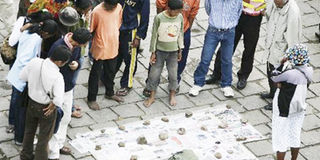Madagascar to review deals with foreign investors

Locals gather to read newspapers in Antananarivo on March 19, 2009. Norway said an aid freeze slapped on Madagascar earlier this week remained in force under the new government of President Andry Rajoelina. Photo/REUTERS
Madagascar's army-backed government says it will review contracts with foreign investors agreed by the previous administration if the economic climate improves, and revise any deals not in the public interest.
On Tuesday, the Indian Ocean island's military appointed 34-year-old opposition leader Andry Rajoelina as president after weeks of deadly street protests.
Madagascar's top court has endorsed the move, but it has drawn international disapproval. No country has officially recognised the new leadership so far.
Benja Razafimahaleo, named finance minister by Africa's newest and youngest leader, said the contracts signed by Rajoelina's ousted predecessor, Marc Ravalomanana, were no good.
"The government gave up everything," Razafimahaleo told Reuters in an interview late on Thursday.
He said Rajoelina, a former disc jockey and mayor of the capital Antananarivo, would take "necessary precautions" to ensure investments in the country's lucrative oil and mineral sectors were good for the masses. He did not elaborate.
But he said the global economic downturn meant reviewing any of the deals with foreign investors would have to wait.
"Right now we are not well placed to re-negotiate establishment agreements because the climate is not particularly favourable for them either," Razafimahaleo said.
On Thursday, a representative of QMM, a subsidiary of UK-based Rio Tinto, which started extracting ilmenite earlier this year, said the company was waiting for clear policies from Madagascar's new government.
A day earlier Rajoelina said a deal for South Korea's Daewoo Logistics to lease over 1 million hectares of Madagascar for food crops was off.
His takeover of power after weeks of turmoil that killed at least 135 people has also hit the $390 million tourism sector.
Razafimahaleo said the new transitional authority would be open to foreign investors and that it was a priority to create an investor-friendly political environment. He has promised to hold elections within two years.
"Previous political crises have been poorly resolved, there are frustrations within our society, so the ground is not at all certain for investors," he said.
Analysts warn that the world's fourth largest island, which has a politically volatile history, risks more instability in the coming months.
"We will survive"
Rajoelina tapped into a deep vein of public anger at Ravalomanana's failure to tackle poverty, despite presiding over a period of steady economic growth.
In December, Madagascar's finance ministry predicted economic growth of 7.5 percent in 2009. The new president has vowed to boost food security and create jobs.
His rise to power has been met with a slew of criticism from the international community and African neighbours. Southern African countries have refused to recognise the new leadership and urged all other countries to reject him too.
The EU said it depended what happened.
"In Madagascar we had a coup d'etat, not democratic elections, so for the moment we shall have to adopt a prudent approach and see how things develop," Czech Foreign Minister Karel Schwarzenberg, whose country holds the EU's rotating presidency, told reporters.
Norway said an aid freeze imposed this week remained in force and said other unnamed donors had taken the same step.
Razafimhaleo said 70 percent of Madagascar's budget was funded by donors. But he remained bullish that the country would cope if those governments cut support.
"If they suspend aid, it's not the end of the world, we will cope with the consequences and survive," he said.
"We don't see why they should want to penalise a nation which has rid itself of a tyrant. That is like saying if Zimbabwe gets rid of Mugabe we will cut aid."
Razafimhaleo, who said he had no forecast for economic growth this year but hazarded a guess at 5-6 percent, said Madagascar would be asking multilaterals for $500 million over the next two years. He said the money would be targeted at small, effective projects and not "white elephants".
"Our priority is to ensure food security. That is to say to lower the prices of essential foodstuffs and to fight hunger in certain corners of the island," he said.




